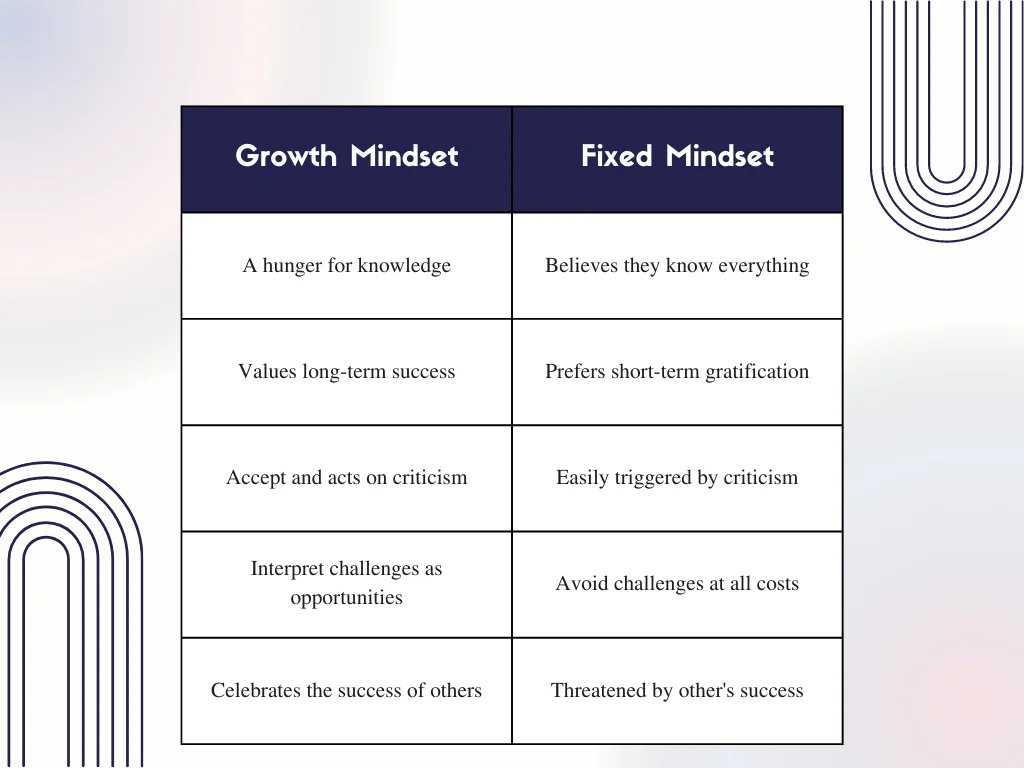Mindset: The Starting Point For Change
gjc
on
April 18, 2023
The mind is the powerhouse that shapes your entire being. However, a mindset is just a belief that can easily be replaced. This article unravels the difference between a growth and fixed mindset and what it does to and for you. You decide whether you choose a fixed mindset where everything’s set in stone or a growth mindset that takes you on an incredible adventure.
You must have thought about what you intend to get out of your career–to make the most out of it or make enough money to ‘get by‘. Your choices are pre-determined by your mindset, where there are two kinds: the growth mindset and the fixed mindset.
People with a growth mindset seize opportunities to improve and develop. In contrast, a fixed mindset leans toward familiarity, whose minds are set in stone.
Our mindset is fundamental for development. Aside from learning, it impacts other areas of our lives, such as careers, relationships, and lifestyles. It shapes our character, seeps into our speech, and moulds our decisions and actions. A mindset is a belief, and it’s something in your mind that you can change.
Fixed Mindset
A fixed mindset dismisses people from the privilege of ‘becoming‘; they already have to be. To them, criticism is likened to ugly marks, and failure seems like a forewarning of incompetency. When faced with failure, their ego takes a hit, and they either blame others or give up.
Some dwell too much on past praises of their talents and gifts, hoping it elevates them to a higher status wherever they go. While this mindset creates a consciousness that they already know the permanent truth about their competence, they become unbothered with trying so hard—either they have the talent or don’t.
Growth mindset
A growth mindset acts in contrast; they understand that deliberate practice works best with a resilient mind. It’s a mindset centred on self-development and not outdoing others, for they find value in what they work on, no matter the outcome.
Failure doesn’t faze them for long. Instead, they determine areas needing improvement and establish a plan for the follow-through. However, the growth mindset does not force anyone to pursue something, but it’s saying there’s always an opportunity for refinery, it builds mental toughness, where qualities like these eventually develop into characteristics of a champion.
American psychologist and author of Mindset, Carol S. Dweck, wrote, “When you think you’re not good at something, you can still plunge into it wholeheartedly and stick to it… you plunge into something because you’re not good at it.”
Confidence vs Willpower
Does this mean people with a fixed mindset need more confidence?
While confidence is a double-edged sword, it’s not a necessary element in a growth mindset because they are affixed on improvement and development. People with a fixed mindset can walk into anything feeling overconfident but pulls back quickly when plagued with setbacks. Conversely, willpower is what you need. It’s rejecting short-term gratification to pursue long-term goals or objectives.
Here’s a comparison between the two mindsets:

Before you pass any harsh judgement toward those with a fixed mindset, understand that there are plenty of factors influencing the way they think, such as:
- The perception of failure and the reactions received
- Continued struggle or failure despite the effort and long hours
- Influence and observation of their peers
- Lack of guidance
- Former pedagogy
- Nature vs nurture
Mindset: charting a new course

Ironically, many growth-minded people had no plans to reach the pinnacle, but somehow, they focused on doing what they loved. The top is where the fixed mindset aspires to be, but the growth mindset reaches it because of their pursuit to better themselves.
It’s challenging to let go of things you’re accustomed to. And especially when you intend to substitute it with a mindset that embraces challenges that takes you out of your comfort zone.
Five ways you can adopt a growth mindset:
- Determine your fixed mindset triggers
Figure out what triggers your fixed mindset, it could be past feelings of hurt and pain that stop you from attempting the task again, or there was no fruition despite the effort.
- Be intentional with your actions, thoughts and words
As you become intentional in what you say, do or act, you begin to slow down and be more aware of what slow growth can do for you; it helps you appreciate the process.
- Seek help and advice from people with growth mindsets
We learn better from one another. Look around to see who inspires you through their pursuit of growth and development. They are the ones who can give you valuable and actionable insights.
- Daily reflect on your failures and successes
Self-reflection helps you evaluate your mistakes and acknowledge your accomplishments. You will begin to realise what works and what doesn’t.
- Reward effort, not traits
Talent and gift are traits that will only get you so far, but what you invest–deliberate practice, effort, perseverance–will get you what you desire.
The mindset is the starting point for change. Knowing what you want to achieve is the first step, but making it happen is where the real work comes in, so stick around and be patient. Unless, of course, you decide you’re comfortable living an ordinary life.
Written & Illustrated by Destiny Goh
Marketing Communications Executive


